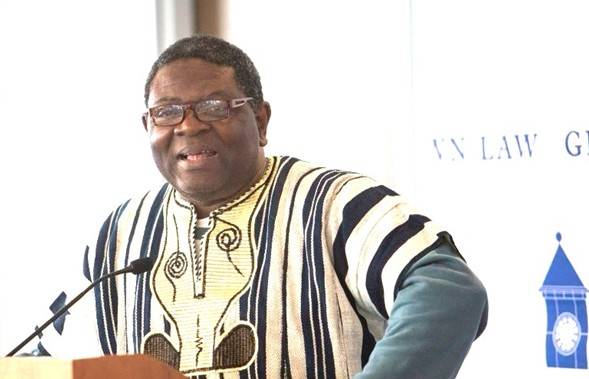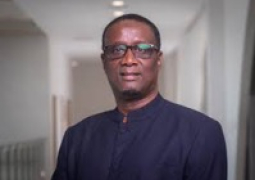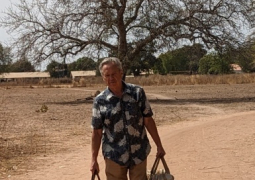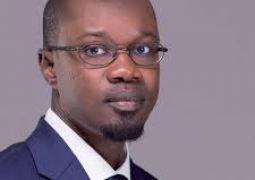
At the African Climate Summit in Addis Ababa, Liberian lawyer Alfred Lahai Gbabai Brownell Sr. issued a searing call for justice, demanding that Africa stop asking and start claiming its right to a livable planet.
Addis Ababa, Ethiopia —The room grew quiet as Alfred Lahai Gbabai Brownell Sr. approached the podium. Outside, the African Climate Summit buzzed with conversations about carbon markets, green growth, and adaptation finance. Inside Room M4, however, the mood was different — focused, intense, and unmistakably human.
“Was slavery not enough?” Brownell asked quietly. “Was colonialism not enough? Why must Africa now pay the price for a climate crisis it did not cause?” For a moment, no one moved. Activists in the audience sat suspended in the weight of his words. It wasn’t just a speech. It was an indictment, a reminder, and a declaration: Africa is done asking for justice — it is now claiming it.
The Lawyer from Liberia
Alfred Brownell is no stranger to struggle. A Liberian environmental lawyer and founder of the Global Climate Legal Defense Fund (CLiDeF), he co-founded Green Advocates International and is a 2019 Goldman Environmental Prize laureate for Africa. For years, he defended forest communities against powerful multinational corporations — advocacy that cost him his safety and forced him into exile after threats and attacks for opposing palm oil expansion on customary lands.
Now, standing in Addis Ababa on September 10, 2025, he spoke not as an exile but as a messenger — carrying the collective voice of a continent.“For too long,” he said, “Africa has been told to wait — to let others define what climate justice means. That time is over.”
Brownell’s address came at a side event titled “Centering Justice in Climate Action — The Advisory Opinion and Human Rights-Based Solutions.” The event marked a critical moment in a bold new initiative: a petition before the African Court on Human and Peoples’ Rights seeking an Advisory Opinion on African states’ legal obligations in the context of the climate crisis. It is the first of its kind.
If successful, it could establish that every African government has a binding duty — not a moral suggestion — to protect its people and ecosystems from the ravages of climate change. Governments could no longer expand fossil fuel projects, ignore community rights, or criminalize environmental defenders without consequence.“This is not an appeal for sympathy,” Brownell said. “It’s a demand for accountability.”
The Birth of a Movement
Behind this petition stands the African Climate Platform (ACP) — a coalition of civil society organizations, Indigenous groups, women’s collectives, youth networks, and scientists. They are the unsung architects of Africa’s most ambitious climate justice effort yet.
Over months of consultations across the continent — from fishing villages in Senegal to pastoralist communities in Kenya — the coalition gathered testimonies, data, and experiences. The result is a document rooted not in abstract law but in African reality — a legal text that breathes with the voices of those who have lost farms, homes, and loved ones to floods, droughts, and displacement.
“This is Africa’s jurisprudence,” Brownell said. “Not borrowed from The Hague, not written in Brussels, but born from our soil, our struggles, and our sovereignty.”
Defending the Defenders
The seeds of this petition were planted in pain. Three years ago, disturbed by the surge in abductions, killings, and prosecutions of environmental defenders worldwide, Brownell founded CLiDeF — the Global Climate Legal Defense Fund.
CLiDeF provides legal and financial support to activists, lawyers, journalists, and scientists targeted for challenging extractive industries and repressive governments. “We defend those who defend the planet,” Brownell explained. “Because if we don’t protect them, who will protect us?”
Through local lawyers and a growing international network, CLiDeF has built a quiet lifeline for activists — ensuring that those silenced in one courtroom can be defended in another. But for Brownell, defending individuals was only part of the solution. The larger battle, he realized, must be systemic — to make justice not an exception, but a rule. Hence, the petition.
A Continent Under Siege
Brownell’s tone hardened as he recounted the evidence driving the legal move. In West Africa, cocoa farms — lifelines for over a million farmers — are collapsing under rising temperatures. In East Africa, six failed rainy seasons have left millions without food.
In North Africa, Morocco’s second-largest dam has dropped to less than six percent capacity. Across the region, people have been jailed for demanding access to water. And in Southern Africa, the worst drought in a century has pushed more than 60 million people into emergency aid.
“These are not numbers,” Brownell said. “They are families, communities, and nations struggling against a storm they did not create.”His words were less a lament than a warning — that Africa’s climate crisis, if left unchecked, could undo decades of development and peacebuilding.
From Appeals to Obligations
The petition before the African Court represents a quiet revolution — shifting climate advocacy from moral persuasion to legal obligation.
For decades, African governments have signed climate agreements and issued promises. Yet those commitments have remained largely voluntary. The petition seeks to make them binding.
If the Court agrees, its Advisory Opinion would establish that environmental protection is not optional but a legal duty — as fundamental as the right to life itself.“This is Africa’s legal awakening,” said one delegate from Kenya. “It means our leaders can no longer hide behind excuses or delay. The law will compel action.”
The Moral Reckoning
As Brownell’s address drew to a close, his tone softened. He looked out over the crowd — young activists, lawyers, and students — and asked the question that has haunted Africa’s history: “How much more must we pay?”The question was not only about climate change but about continuity — the centuries-long cycle of extraction and exploitation that left the continent bearing burdens it did not create.
“Are you telling us that slavery, theft, and the plunder of our lands were not enough?” he asked. “Why must we now pay the price for the lifestyles of the privileged and the rich?”
No one answered. They didn’t have to. In that silence, a truth hung heavy — that Africa’s demand for climate justice is not just about carbon. It is about memory, dignity, and survival.
A Future Africa Can Author
As the event ended, applause filled the room — not the polite kind reserved for summits, but the kind that comes from conviction.For many, the petition represents more than a legal instrument. It is a collective act of courage — a reminder that Africa is not merely a victim of global injustice but a leader in shaping justice itself.
“Climate justice is not charity,” Brownell concluded. “It is a right. And that right begins here — on African soil.”
Outside the conference room, the sun was setting over Addis Ababa. Delegates hurried between sessions as new policy statements rolled out. But for those who heard Brownell speak, something deeper lingered — a sense that Africa’s fight for climate justice had entered a new era. One built not on pleas, but on power.
Peter Quaqua is a Liberian journalist and media development specialist focusing on governance, human rights, and climate justice in Africa.quaquapeter@gmail.com




